
Chemija
metrics 2024
Elevating Chemical Knowledge, One Article at a Time.
Introduction
Chemija is a prominent journal in the field of chemistry, published by LIETUVOS MOKSLU AKAD LEIDYKLA in Lithuania. With a focus on diverse topics within the realm of chemistry, this journal aims to disseminate original research articles, reviews, and discussions that advance the understanding and application of chemical science. Although it currently holds a Q4 ranking in the miscellaneous category of chemistry, Chemija is committed to elevating its impact through the publication of high-quality research, making significant contributions to the discipline. The journal operates under a non-open access model, ensuring that articles undergo rigorous peer review to uphold academic standards. Researchers, professionals, and students are encouraged to explore the wealth of knowledge within its pages as it endeavors to bridge gaps across various subfields of chemistry from 2008 to 2024. With a dedicated readership and a growing database of insightful publications, Chemija serves as an essential resource in the ever-evolving landscape of chemical research.
Metrics 2024
 0.17
0.17 0.50
0.50 0.60
0.60 17
17Metrics History
Rank 2024
Scopus
IF (Web Of Science)
JCI (Web Of Science)
Quartile History
Similar Journals

French-Ukrainian Journal of Chemistry
Uniting Perspectives, Enriching ChemistryFrench-Ukrainian Journal of Chemistry, published by TARAS SHEVCHENKO NATIONAL UNIVERSITY OF KYIV, is an esteemed open-access journal that has been contributing to the field of chemistry since 2013. With the aim to foster collaboration and knowledge exchange between French and Ukrainian scholars, this journal provides a platform for innovative research, reviews, and discussions that advance the understanding of chemical sciences. Operating under the ISSN 2312-3222, it boasts a commitment to accessibility, ensuring that all published content is freely available to researchers, professionals, and students worldwide. This initiative enhances the visibility of critical findings and insights in a rapidly evolving scientific landscape. Aimed at promoting high-quality research, the journal invites submissions that encompass a wide range of chemistry-related topics, thereby supporting the growth of interdisciplinary approaches and international cooperation in the field.

JOURNAL OF THE CHILEAN CHEMICAL SOCIETY
Advancing Chemistry through Collaborative Research.The Journal of the Chilean Chemical Society, published by the Sociedad Chilena de Química, serves as a premier platform for disseminating significant research findings in the field of Chemistry. With an ISSN of 0717-9707, this journal has established its presence since 2003, providing open access to a diverse range of studies and advancements in this vital scientific domain. It currently holds a Q3 category ranking in Chemistry (miscellaneous) and ranks 196 out of 408 in the general chemistry category on Scopus, indicating its valuable contributions to the field. Through the journal, researchers, professionals, and students are encouraged to engage with cutting-edge research and foster collaboration among the scientific community in Chile and beyond. The society's commitment to excellence ensures that articles published reflect high-quality research, underpinning the journal’s role in shaping knowledge and innovation in chemistry.

RUSSIAN JOURNAL OF GENERAL CHEMISTRY
Pioneering Research for Tomorrow's Chemical ChallengesThe Russian Journal of General Chemistry is a prominent scholarly publication dedicated to advancing the field of general chemistry. Published by MAIK NAUKA/INTERPERIODICA/SPRINGER, this journal contributes significantly to the global chemistry landscape, offering a platform for researchers and professionals to share their latest findings and methodologies. With an ISSN of 1070-3632 and an E-ISSN of 1608-3350, it has established itself as a resource for high-quality research articles since its inception in 1996. Though currently indexed in the Q4 category for chemistry (miscellaneous) and ranking #299 out of 408 in general chemistry according to Scopus, the journal remains an important venue for academic contributions that bridge gaps in traditional chemical disciplines. Desiring to cater to a diverse range of interests within chemistry, the journal actively encourages submissions that reflect significant scientific achievements, innovations, and collaborative studies. Although the journal does not currently offer open access, its role in disseminating crucial chemical research cannot be overstated. Researchers and students alike will find valuable insights and rigorous scientific discourse in its pages.
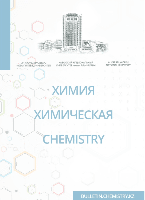
Chemical Bulletin of Kazakh National University
Exploring New Frontiers in Chemical SciencesThe Chemical Bulletin of Kazakh National University is a prominent open-access journal dedicated to advancing the field of chemistry. Published by AL-FARABI KAZAKH NATIONAL UNIVERSITY, this journal serves as a vital platform for disseminating original research, reviews, and innovative findings in diverse areas of chemistry since its transition to open access in 2012. With an ISSN of 1563-0331 and an E-ISSN of 2312-7554, the journal aims to reach a global audience, fostering knowledge exchange among researchers, professionals, and students in the scientific community. The publication seeks to promote high-quality research that contributes to the understanding and application of chemical sciences, particularly in the context of Kazakhstan and the broader Central Asian region. Given the journal's commitment to making research freely accessible, it stands as an invaluable resource for anyone engaged in the study and application of chemistry.

HELVETICA CHIMICA ACTA
Empowering Researchers with Peer-Reviewed ExcellenceHELVETICA CHIMICA ACTA, published by WILEY-V C H VERLAG GMBH, stands as a pivotal journal in the fields of chemistry and chemical research. Established in 1918, this esteemed journal spans a diverse array of topics, including biochemistry, catalysis, drug discovery, inorganic and organic chemistry, as well as physical and theoretical chemistry. With influence reflected in its noteworthy Q2 and Q3 quartile rankings across these categories as of 2023, HELVETICA CHIMICA ACTA continues to capture the interest of the global scientific community. Although not an open-access journal, it remains accessible through various academic institutions, ensuring broad reach and collaboration opportunities. Researchers, professionals, and students alike will find its meticulously peer-reviewed articles critical for advancing knowledge and fostering innovation within the chemical sciences. As the journal converges toward 2024, it remains committed to publishing high-quality, impactful research that supports the evolution of chemistry across its multifaceted disciplines.
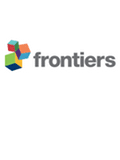
Frontiers in Chemistry
Connecting Researchers to the Frontiers of Chemistry.Frontiers in Chemistry is an esteemed and innovative Open Access journal published by FRONTIERS MEDIA SA, based in Lausanne, Switzerland. Since its inception in 2013, the journal has established itself as a leading platform for the dissemination of high-quality research across a broad spectrum of chemistry disciplines, achieving a notable Q1 classification in the miscellaneous chemistry category as of 2023. With an impressive Scopus rank, placing it at 72nd out of 408 in General Chemistry and falling within the 82nd percentile, Frontiers in Chemistry is committed to publishing significant findings that contribute to the advancement of the field. The journal's Open Access model ensures that research is freely accessible to all, fostering a greater exchange of knowledge and collaboration among researchers, professionals, and students globally. It covers a range of topics, from organic and inorganic chemistry to materials science and biochemistry, making it an essential resource for anyone seeking to stay at the forefront of chemical research.

Jordan Journal of Chemistry
Catalyzing Collaboration: Where Local Chemistry Meets Global Science.The Jordan Journal of Chemistry is a prominent publication dedicated to advancing the field of chemistry in Jordan and beyond. Published by the Yarmouk University Deanship of Research & Graduate Studies, this journal serves as a platform for researchers, educators, and practitioners to disseminate their findings in a variety of chemistry sub-disciplines. Although currently classified in Q4 of miscellaneous chemistry and ranking within the 9th percentile according to Scopus, the journal plays a crucial role in fostering academic dialogue and collaboration in the region. With its ISSN 1814-9111 and E-ISSN 2079-7249, the Jordan Journal of Chemistry offers open access to researchers from diverse backgrounds, ensuring that critical research is both accessible and impactful. By bridging local studies with global scientific advancements, this journal is poised to contribute significantly to the growth and recognition of chemistry as a key scientific discipline in the region, with convergence efforts set from 2020 to 2024.
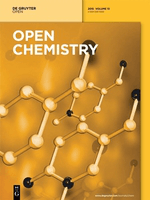
Open Chemistry
Catalyzing Progress in Chemistry and Materials ScienceOpen Chemistry, published by DE GRUYTER POLAND SP Z O O, is a distinguished peer-reviewed journal that has been serving the global chemistry community since its inception. With an ISSN of 2391-5420 and an E-ISSN also of 2391-5420, this open-access journal has been accessible to researchers and practitioners alike since 2015, ensuring a wide dissemination of high-quality research findings. Located in Germany, specifically at BOGUMILA ZUGA 32A STR, 01-811 WARSAW, MAZOVIA, POLAND, Open Chemistry aims to publish innovative research across various chemical disciplines, with special attention to miscellaneous chemistry and materials chemistry. It is currently ranked in the Q3 category for both fields as of 2023, reflecting its solid standing within the academic community, with specific ranks of 187/408 in General Chemistry and 153/317 in Materials Chemistry, corresponding to respective percentiles of 54 and 51. Open Chemistry not only enhances the accessibility of cutting-edge research but also serves as a vital resource for students, professionals, and scholars seeking to advance their knowledge in the rapidly evolving landscape of chemical sciences.
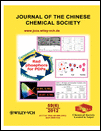
JOURNAL OF THE CHINESE CHEMICAL SOCIETY
Showcasing Excellence in Chemical ResearchJOURNAL OF THE CHINESE CHEMICAL SOCIETY, published by WILEY-V C H VERLAG GMBH, is a vital resource in the field of chemistry, focusing on a broad array of topics pertinent to general chemistry and its advancing sub-disciplines. Established in 1954 and running through 2024, this journal serves as a significant platform for the dissemination of high-quality research, showcasing innovative findings and developments within the chemical sciences. With its Q3 category ranking and positioning at Rank #203 in General Chemistry per Scopus, it reflects the journal's commitment to research excellence and impact. While not an open-access publication, it ensures accessibility to a global audience, making it an essential tool for researchers, professionals, and students alike seeking to stay informed and engaged in the evolving landscape of chemistry.
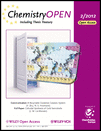
ChemistryOpen
Empowering Research Through TransparencyChemistryOpen is a leading open access journal published by WILEY-V C H VERLAG GMBH, dedicated to advancing the field of chemistry. With its ISSN 2191-1363, this journal has been a vital platform since its inception in 2012, promoting unrestricted access to innovative research findings and critical reviews in various chemistry domains. As a testament to its growing influence, ChemistryOpen has achieved a commendable Q2 quartile ranking in the 2023 Chemistry (miscellaneous) category, which highlights its quality and impact within the academic community. Researchers, professionals, and students benefit from the journal's commitment to making high-quality research accessible, facilitating knowledge transfer and collaborative insights among chemists worldwide. The journal's transparent open access model ensures that groundbreaking discoveries and methodologies are readily disseminated, fostering a culture of innovation and interdisciplinary dialogue in the ever-evolving landscape of chemistry.